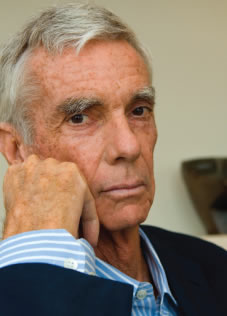Eggs in the medical basket

The late Andrew McKelvey attributed his success in business to hard work, persistence, timing, and instinct. His support at Emory allowed the lung transplant center to recruit new faculty, build research labs, improve patient care, and triple its number of lung transplants. |
Andrew McKelvey's gifts to Emory University's School of Medicine has far-reaching effects.
Founder of the online job-search giant Monster.com, Andrew McKelvey began his career at age 12. He delivered eggs door to door for a dime-a-dozen profit and was hooked on business. He believed his great success since those humble beginnings came with an obligation to do good.
Before his death in November of pancreatic cancer, McKelvey made good on that obligation through designation of more than $25 million to the McKelvey Center for Lung Transplantation and Pulmonary Vascular Diseases at Emory. The gift has enabled Emory to recruit a dozen star faculty members, build new research laboratories, advance the treatment of patients with lung disease, and triple its number of lung transplants. It also has provided seed money to young researchers to pursue new approaches to lung disease.
McKelvey himself had sarcoidosis, which causes inflammation and scarring of the lungs, reducing their capacity. He credited Emory pulmonologist Clint Lawrence for improving the quality of his life.
Support from donors like McKelvey has impacted people, places, and programs throughout Emory’s School of Medicine. Donor investments, for example, have led to innovations such as the world’s first artificial cornea transplant, repair of hearts while they are still beating, and development of a drug used to treat 94% of Americans with HIV/AIDS. They have allowed Emory to train more than 32,000 physicians, who over time have staffed the majority of Georgia’s hospitals and health care practices. They have helped the school open a new building with simulation laboratories, wireless classrooms, and technologically advanced auditoriums for training the next generation of medical professionals.
Likewise, donors have supported a research base that is taking on heart disease, Alzheimer’s, Parkinson’s, cancer, and other major killers. Emory researchers are developing islet cell transplants to treat diabetes and working to decrease organ rejection after transplantation. They are making possible initiatives by Emory with other universities to develop biomedical nanotechnologies to detect cancer before it gains a foothold and to change the model of health care from disease treatment to prevention.
Like McKelvey, these donors are putting a lot of eggs in Emory basket.
|
|



